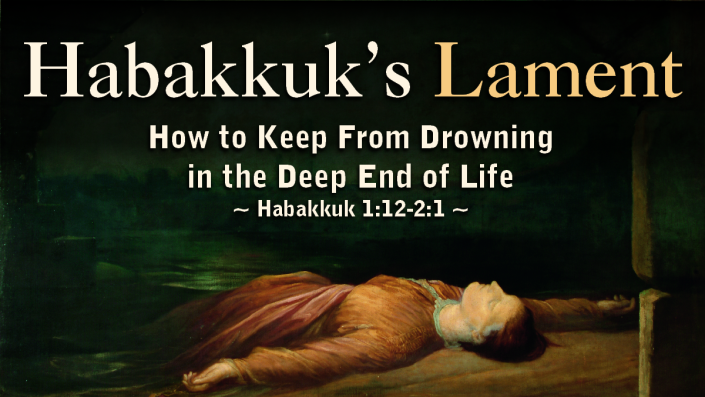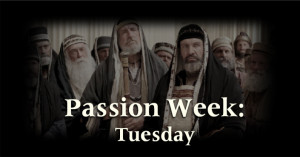Click Here for Audio
[cross-posted from www.ArtOfTheChristianNinja.com]
Lifeguard Training
My kids have been in swimming lessons for quite a while. I took them when I was a child, as most people do, but I’m nowhere near as good at swimming as my kids are. Even my littlest, Eowyn, knows more strokes and techniques than I do. To be totally honest, I only ever made it to the third level – which they called “RED” at the time – because I failed it over and over and over. Eventually my mother got tired of paying for me to fail and said, “Well, you won’t die if you fall out of the canoe, so I guess that’s enough.”
Our intention, right now anyway, is to have all of our kids take enough lessons that they will be certified lifeguards and instructors. Ethan has already completed Bronze Cross and has First Aid and CPR, training – which is good, because that allows me to eat as much poutine as I want, with total impunity, knowing if I choke on a cheese curd or keel over with a heart attack, Ethan will be there to save me. Eventually, I will be surrounded with children that will not only be able to save me, but also teach others how to save their poutine loving fathers.
As I’ve watched my children develop in their swimming abilities, I’ve seen them take on bigger and bigger challenges. At the beginning of their training, the instructors have them jump into the shallow end of the pool, always within arms reach, and then hold them up by their tummies to practice their strokes, whispering nice, encouraging words in their ears the whole time. They tread and splash for a few moments and then sit on the side and watch others do the same. It’s very sweet.
However, as the lessons continue, it gets a lot less sweet. My boys, who have been doing this for a while, come home from swimming lessons with some very interesting stories. I’ll ask, “What did you do today, son?” and they will relate quite a grueling regimen of exercises. Long gone are the days of tummy holding and whispered encouragement.
“Well dad, during my three hour class, we started with an hour of book work, memorizing acronym after acronym after acronym, and then moved on to oral and practical quizzes. Then we were told to get in the water and swim 24 laps in under 12 minutes. After that, they told us to tread water in the deep end for five minutes – but THIS time, they dropped a 10 pound weight to the bottom of the deep end and had us retrieve it and then tread water while passing it around to each other. Then it was time to practice some rescues, which means dragging my classmate’s limp bodies out of the pool over and over – and if I didn’t do it perfectly I would have to do it again. And when we finally got them out, it was time for ‘land rescues’ where we practice saving people from choking, bleeding, passing out, having a stroke, and more – sometimes as they attack me! Oh, and by the way, the test is next week and if I make one mistake –their head goes under water, I misdiagnose, or I take my eyes off of them – I fail immediately and have to take the class all over again.”
Drowning in The Deep End
To their credit, my kids rarely complain about the work they are required to do during their classes. They know that what they are learning is important and that it takes dedication and skill to do it right. And of course, my response as a Dad is never to say, “Oh, that’s too bad! I wish they would take it easier on you.” No way, It’s “Good! I hope next week is even harder! That’s building some character! Now drop and give me 20!” (It’s a tough life at my house…)
Now, would any of us here criticize the instructors for being too hard on the students? Sure, we can’t take the toddlers and drop them in the deep end, tied to 10 pound weights, right? That’s not only inappropriate, but probably illegal.
But if we are going to give people the title of “LIFEGUARD” and give them a little piece of paper that says they are “LIFESAVERS”, then I think it’s right that they be rigorously trained and tested!
It’s no different in the Christian faith. I don’t say this lightly, but most Christians do not have a very strong faith. There are a lot of folks in our churches that are content to spend their lives paddling around the shallow end of the pool. They’re like me when it comes to swimming lessons: they think they know enough not to drown, but that’s it.
The problem is that this world isn’t a good place right now for people who don’t know how to swim in the deep end. The issues that are pressing against us are incredibly complex and go far beyond our human ability to contemplate, let alone, attempt to address. We are living in the deep end right now and there are a lot of people who call themselves believers that are struggling to stay afloat. They don’t know what to do when the waves of change crash against them and they are pulled down into the riptide of popular culture. As they sputter and flounder, they do foolish things like trust their emotions and seek wisdom from pagans. They don’t know how to pray or read God’s word and are leaving the church in droves.
It is my deepest desire that we don’t make that mistake. Even our little church out here in the middle of nowhere feels the crash of the waves of change and the pull of popular culture. We can’t avoid it – so we’d best be prepared. Not just for ourselves, but so we can help save others.
When we or someone else at our church gets nailed by crisis – whether that’s crisis of health, finance, or faith – don’t we want to be a group of well trained lifeguards that know our stuff and can jump in and save them? Rather than being like the untrained and useless masses of people that simply stand on the sidelines muttering how they wish they could do something, but not knowing how – or worse, throwing stones at the one that is hurting, hoping it might help.
It is my belief that the issues that strike the deepest part of our hearts are addressed by God in His Word. God may not answer every question that interests us, but He has certainly answered all the ones that we need to know. That’s why we need to know God and His Word. Because we and everyone around us – our children, friends, coworkers, strangers, and enemies – have big questions, and most of us are ill equipped to give any answers.
Don’t get me wrong; I’m not talking about having a bunch of pat answers under our belt so we can be the smartest person in the room or win debates with unbelievers. No, far more important is that we need to know these things so we can know God.
The problems of this world, those that happen inside and outside us, make so much more sense when we know in our heart, soul and mind that God is always good and always just. As long as we wonder if God cares about us, wonder if He even sees the problem, wonder if He’s punishing us, wonder if He’s being unfair, unjust or unkind, then we will forever live in fear and doubt. Uncertainty about God creates a life filled with anxiety.
That’s the normal life of the pagan, the atheist, and the immature believer. They live in anxious fear. They always feel insecure. Below their feet is shifting sand. They try to find security in all sorts of places: politics, money, healthcare, military power, personal relationships, new technologies, scientific progress, counsellors, teachers, entertainment, religion… but the problem is that every foundation they try keeps changing! Almost nothing the same as it was 10 years, 100 years, 1000 years ago. So they live in fear. It’s only a matter of time before the next wave hits, their foundation fails again, and they are set adrift on seas that they can neither navigate nor swim.
Have you felt this? All hell breaks loose around you, and you realize that your foundation is uncertain. Life gets very unfair and you realize that the things you thought were going to get you through, simply let you down. That’s life in the deep end. We all feel it, but I don’t want any of you to drown. No believer should live in constant fear that God has forgotten them or is going to abandon them. No believer should be crushed under the weight of this world. No believer should feel like they will drown in their sorrows.
Yes, we will feel the fear. Yes, we will feel the burden. Yes, we will feel the pain of loss. Yes, we will feel the frustration. But when those feelings come, believers have access to something greater, an off switch to the emotional roller coaster. We know that our lives are built on the unchanging Word of our immutable God, who always keeps His promises, and will always see us through.
Habakkuk’s Follow Up Question
Last week we talked about Habakkuk’s first question, “Why does God let bad things happen?” and this week we are going to look back at the conversation to see that Habakkuk isn’t done with his big questions yet. God just dropped a bomb on him saying that his plan to take care of the sin of the nation is to have the people and the cities utterly wiped out by the Babylonian army, and so now we get to the follow up question:
“Are you not from everlasting, O LORD my God, my Holy One? We shall not die. O LORD, you have ordained them as a judgment, and you, O Rock, have established them for reproof. You who are of purer eyes than to see evil and cannot look at wrong, why do you idly look at traitors and remain silent when the wicked swallows up the man more righteous than he?
You make mankind like the fish of the sea, like crawling things that have no ruler. He brings all of them up with a hook; he drags them out with his net; he gathers them in his dragnet; so he rejoices and is glad. Therefore he sacrifices to his net and makes offerings to his dragnet; for by them he lives in luxury, and his food is rich. Is he then to keep on emptying his net and mercilessly killing nations forever?” (Hab. 1:12-17)
Start Humbly
There’s a lot of emotion in this section. As I said, these are HUGE questions. They get to the deepest part of humanity’s problem with evil, and seek to understand the most complicated details of God’s plan of salvation.
But I want you to notice something first. I want you to see something critically important. If there’s one thing you get out of this sermon, let this be it: Habakkuk begins his prayer with humility and faith. There is no doubt that Habakkuk believes God is greater and more righteous than he is. He may have no idea what’s happening or why, but his prayer starts in the right place. This is where we must start as well. We must not start our prayers thinking we are equal with God, that we get to argue with His Word, or that can come up with a better plan. We are not there to debate or negotiate. Whenever we come to prayer or study, we must come humbly, or we will have wasted it.
“God opposes the proud, but gives grace to the humble.” (James 4:6)
Certainly, Habakkuk is BOLD in his prayer, asking huge questions of God, but he does it in a way that is humble and trusting. Look how many titles he uses for God! He uses God’s names, “YAHWEH” and “ELOHIM”, or “LORD” and “God”. He knows He’s addressing the Creator and Sustainer of the Universe! He’s not talking to “the big guy in the sky” or “his buddy Jesus”. He’s not coming to the conversation as an equal. He knows what he’s doing is audacious. He’s asking GOD to explain himself! That’s ridiculous on its face, but such is the God we love and serve to allow us to approach His throne of grace! He is the Father and He wants to talk to his children, but He’s also GOD.
Next he calls God, “My Holy One”, intimating a personal relationship with Someone who is not only unique, but special to Habakkuk’s heart. He calls God his “Rock”, which is a term from Deuteronomy 32:4, which calls God “The Rock, his work is perfect, for all his ways are justice. A God of faithfulness and without iniquity, just and upright is he.” He sees the Lord as the highest Judge in the highest court, who is perfect in His decisions.
That’s where Habakkuk starts his prayer – on His face before God – and it’s where we must start our prayers. Yes, we can be angry, confused, broken hearted, weeping, pacing, broken, on our knees our shouting aloud. All of those feelings are represented in the prayers of scripture – even the prayers of Jesus. But while we pray, our hearts must be humble.
I believe that if we want answers to big questions, if we want comfort from God in the midst of our trials, then we must come to prayer with the right heart. We start with the belief that God is our unmoveable rock, the worker of our perfection, the upholder of our justice, and the keeper of our faith. It’s personal, and it’s humble.
If we start our prayers thinking that God is weak, out of control, or unfair, then our whole prayer life and relationship with Him will be skewed. Instead of finding comfort, we will be hardening our hearts to Him! But if we come in humbly, knowing who God really is, then even if we have deep hurts, doubts and questions, we’ll at least be in the right place to ask and start to find answers. During these tough times, when questions abound, check your heart before you start to pray.
Lamentations
If you believe in God, then I know you’ve shared these thoughts with Habakkuk. Everyone has. We look at ISIS running around harming more and more people and we say, “God, who is going to stop them?” We look at abortionists and think the same thing. Or pornographers: “They drag their hook through campuses and catch young women and men, gut their souls, and walk away smiling. How long will that last, God?” We look at the global church and see it grow more dysfunctional as it fractures and falls away from the faith of our fathers – and then watch as atheist churches take their place – and wonder how much worse it can get.
We look to our own lives and our own problems with sickness, death, trial, temptation, work, finances, relationships, and everything else – and when we finally hit our knees, our prayers sound very much like these words from over 2500 years go. Nothing is new under the sun.
The Bible word used to describe this type of prayer is “Lament”. We would use the term mourn or grieve, and it’s something we’re not very good at as a culture. We tend to run from our problems or pretend they don’t exist, rather than face them and let them break us down. We’ve lost the ability to lament, and it shows in our culture. Jesus lamented, as did many of the faithful in the Bible, and faithful people that have come since. They faced the difficult things in their life and let their hearts break, so they could bring the pieces to the One who could put them back together.
Today, instead, we usually pretend our heart isn’t broken, make excuses for it, pretend to be healthy, or medicate our feelings away. It’s terribly unhealthy. We need to lament things.
Now, lamenting isn’t just feeling sad. “Lamenting” has a more formal meaning and goes beyond emotion. What it means is that we take our heartache TO Someone who will listen, and, hopefully, do something about it. The Bible is full of laments, most often songs – which means they’ve been given some thought and inspiration. A lament isn’t merely raw emotion, but are the well-considered, meditated upon, thoughts of a believer, brought before God.
It’s not that raw, emotional prayers are bad. David’s psalms sometimes seem very raw and emotional, as though they were written in the middle of a battle – and perhaps some of them were – but Habakkuk’s writing here (like many other laments in the Bible) is of incredibly high quality, with well chosen, deeply poetic words.
That doesn’t take away from the heartache. Perhaps it even adds to it. He may have chewed on these thoughts, this prayer, this lament, these questions, for a long time. He prayed these thoughts over and over, finding new, better and and different ways to express his grief to God. And since this is inspired scripture (listen carefully), God HIMSELF was working with Habakkuk on this prayer poem. These are words written by Habakkuk and God given to believers to help us express the intense feelings that we sometimes don’t have words for.
Habakkuk’s Questions
Let’s go through Habakkuk’s prayer verse by verse and take it apart a bit so we can see how much it often reflects the prayers of our own hearts
In verse 13 we see Habakkuk’s follow up question of “Why do you idly look at traitors and remain silent when the wicked swallows up the man more righteous than he?” The rest of this section expands on this question. God, how can you use an evil nation like the Babylonians, who are doing more evil than we are to discipline your people? That seems unfair. They get blessed with more land and victory – even though they are worse than us! How can You, the perfect Judge, stand there and allow a greater evil to swallow up a lesser one?
In verse 14-15 Habakkuk uses an illustration that we understand today. He says to God that it almost feels like there’s no accountability in this world. Like we’re all just evolved animals doing whatever we want – that the real rule of life is simply survival of the fittest. The biggest fish rules the pond. Is that how Your world is supposed to work? That doesn’t make sense at all! Aren’t you the God that defends the widow and orphan, helps the helpless, frees the captive? Then why are we living by the law of the jungle right now? The Babylonians are clearly the more evolved and stronger than we are! They are going to chase us, catch us, gut us, eat us and then smile. And are you there… just watching?
In verse 16 Habakkuk keeps arguing his case for why this doesn’t make sense. He points out to God that to make it worse, this wicked nation then turns to give the credit to demons and false gods! Actually, it’s even worse than that. The picture here is of a fisherman catching a fish and then giving worship offerings to HIS NET! He’s giving all the credit for his great victory to his fishing rod. How ridiculous! God, that’s how stupid Nebuchadnezzar and Babylon are! They don’t even know who to thank for their victory! They put their faith in demons and horses and spears rather than the One who Created the Universe! God, you don’t even get the glory! And to make it even WORSE… after they’ve slaughtered us little fish… they will be richer and more comfortable. God, this nation will NEVER turn to you because all the evil plans they come up with are doing so well!
And then verse 17 really strikes home: “Is he then to keep on emptying his net and mercilessly killing nations forever?” I can imagine that there are a lot of people living in in the world right now who have prayed this prayer – and it has echoed through ages past. The persecution and genocide of Christians around the world now, the Jews during World War 2, the African slave trade, the Acadians… and it goes on throughout history.
God how long, exactly, are you going to let this go on? This can’t last forever. It just can’t! Can it? This seems totally backwards. This seems so wrong. Evil is winning and good is losing. The victory is going to demons and fools. You get no glory, no praise, and the faithful are punished. This is so confusing. This is heartbreaking. The pain is excruciating and I don’t know how much longer I can take it. How can you stand it?
In some ways, though we’ve never been through the extreme persecution of some, we’ve all asked that question, right? Do you realize how much differently this prayer would have gone if he wouldn’t have started out humble? These are not accusations. These are big questions, but they are not accusations against God. This is a person with deep hurts and confusion, pouring his heart out to God. I know many of you have been in this situation.
Sitting in the Watchtower
Habakkuk ends his prayer in 2:1 by saying, “I will take my stand at my watchpost and station myself on the tower, and look out to see what he will say to me, and what I will answer concerning my complaint.”
“Ok, God. I’ll be quiet now and listen. I’m going to watch for your answer.” We could learn a lot from that. How often do we pray and then forget to listen?!
He trusts that God, His ROCK, won’t let him down, but will make His will known. Habakkuk’s plan is to go to the watchpost, sit in the tower, and wait for what God will do. He knows Babylon is coming and will see them from the tower. He will witness firsthand the fulfilment of prophecy, the justice of God. But, as he watches for what God is doing… he’s also waiting to see what God will do.
Context
Remember last week’s helicopter view of life that God gave him. Now we see Habakkuk choosing to find a higher vantage point where he can watch not only what God is doing, but what He will do. God has given him a bigger perspective of life, and now that’s the lens he’s using to see the world.
God does that sometimes for us too. We come to him in prayer, we lament before him, and He raises us up higher, shows us some scripture or gives us a special message from a friend or a sermon, that allow us to see more of what is happening. And then He gives us a chance to chew on that knowledge for a while.
We are left to meditate on what God has said, and it requires discipline for us not to slide back down to the ground and forget all that God has shown us from higher up. What we must do is choose to climb the tower and wait for God – again – but now from a different perspective. We climb the tower and look out for what God is going to do. How will He work this out for my good and His glory? In what ways will He use this? How can this make me or others more Christ-like? This is God’s plan, and though it hurts, I’m going to watch and wait.
Remember the back story. King Zedekiah sends for Jeremiah to get some advice. Jeremiah says he should surrender to Babylon so that they don’t get slaughtered. That’s God’s GRACE in action! That message was God saying that He would be merciful even as He was punishing them, if they would only accept what He is doing. Yes, they would still go into captivity, but He would do it more gently. All Zedekiah had to do was relent to God.
If Zedekiah were up on the tower with Habakkuk, perhaps he would have made a better decision. Instead, like a fool, he chose to fight against God’s plan. He didn’t have the helicopter view. He wasn’t in the tower. He wasn’t listening to God. He didn’t see God as sovereign. He didn’t believe God was his rock. He didn’t trust God’s plan. Instead, he fought God’s plan and that choice brought terrible pain and misery to everyone around him.
Concluding Reminders
That’s as far as we’re going to get this week. We’ll pick up God’s answer next week, but I want to just remind you of a few things that we’ve learned today.
First, remember that Christians have a responsibility to take their spiritual training seriously. This world is a terribly deep and treacherous pool and we will drown if we don’t make the decision to learn how to swim well and help others. Get into God’s word, stay in prayer, and do the works of a Christian. Yes it’s hard. But as Paul said to Timothy, “Keep a close watch on yourself and on the teaching. Persist in this, for by so doing you will save both yourself and your hearers.” (1 Tim 4:16)
Second, it is good for us to bring our heartaches to God, but we must make sure that our hearts are in the right place. Don’t start your prayer with a laundry list of requests. Start as Jesus taught you to start your prayers, “Our Father in heaven, hallowed be your name.” (Mat. 6:9) God is your Father, God is in Heaven, God and his name is to be hallowed (or made high and worshipped exclusively). Start your prayers there.
Third, don’t be afraid of Lamenting. Lamentations are important – it is one of the ways that we show that we are relenting to God’s plan. It is good to bring our grief to God. It is good for us to wait for him because He will come. Isaiah 30:31 says, “They that wait upon the Lord will renew their strength.” And when He does come, trust that He will raise you up to a heavenly perspective of what is happening. And then, when God has shown up, climb the watchtower and wait to see what He will do next.
That’s where I’m going to leave it today.






